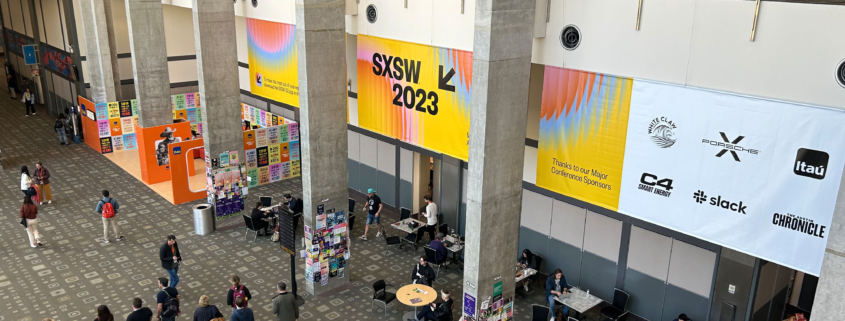- SXSW 2024: The Transition Generation - 15. March 2024
- SXSW 2024: Addressing the Consumers of Tomorrow - 13. March 2024
- SXSW 2024: Monday’s Tech Roundup - 12. March 2024
- Culture Media and Hype Cycles: The future of marketing? - 11. March 2024
- South by Southwest 2024: Embracing the Unknown - 11. March 2024
- Meta “Threads” – short trend or serious threat to Twitter? - 31. July 2023
- SXSW 2023 Day 5: Brand Science - 15. March 2023
When dealing with innovation – and that word gets thrown around a lot at conferences like SXSW – you need a certain level of resilience towards frustration. Most people, when being confronted with something new, tend to be dismissive about it. Most innovations don’t have immediate world-changing effects. Nor personal relevance for everybody. And often they are hard to grasp and easily dismissed. Our fourth day of SXSW 2023 dealt with this topic in various ways.
Will data privacy ruin digital advertising?
Yes, probably. If “ruin” means fundamental change, that is. In our first session of the day, Noor Naseer from Basis Technologies delivered an excellent talk on the current state of the effects of increased data privacy on digital advertising. A consumer base growing more conscious about how their data is being used, increased regulation and a changing media landscape will require marketers to rethink their digital advertising strategies. We all know the 3rd party cookie will go away and will cripple a lot of tracking and attribution systems and targeting options. The big question the digital ad industry is concerned with: will we have viable alternatives by the time this ultimately happens and the answer is: probably, but not as a 1:1 replacement.
In her talk, Naseer laid out the importance of first party data usage, the use of permissible data sources & alternate identifiers, and a coherent tech-stack strategy for data management to keep digital advertising viable – with one downside: we won’t see exact 1:1 replacements for everything we got used to in the last 15 years, so a certain degree of flexibility will be needed. Dismissing any alternatives as non-viable, just because they aren’t exact replicas of the toolset we have today is something we will have to deal with. After all, it might change the future for the better – a digital advertising ecosystem that comes with more trust, user control and ultimately better results, even at the cost of higher friction.
The slides are available for download here.
The best storyteller at SXSW
In the afternoon I attended a particularly enjoyable session by Mike Bechtel, Chief Futurist at Deloitte. In his highly entertaining and insightful presentation titled “A Brief History of the Future”, he laid out the history and evolution of information technology along the three central pillars of computing: interaction, information, and computation. One of the key messages: futurism is all about pattern recognition. To adequately talk about the future, you need to understand the past – as emerging tech progression isn’t random, it follows enduring trajectories over and over again.
The main thesis: AI will turn into an ubiquitous, useful set of tools to make our lives easier – even if it isn’t always perfect. The future of computing lies in decentralized systems and the interfaces of today – screens – will look like anachronistic things of the past very soon, when the main interface will be voice controls and contextual automation. None of the technical aspects were of any surprise to me – in fact we have been talking about these topics for years. But Bechtel is an amazing speaker and turned this session into a masterclass in storytelling with a rare ability of explaining complex concepts with well picked examples and relatable analogies. Being able to learn from a true master in one’s own professional niche is what makes SXSW such a rewarding experience.
Quick, Look East!
Web3, Metaverse and AI – are these the only hype topics of our decade? In today’s session, Tom Nixon, co-founder of Qumin and expert on Chinese digital marketing, threw in another contender for the mix: Social Commerce. In the West, the term often refers to the option of buying a product directly on the app, which is a feature that has been available on many platforms for years. Shoppable Social Ads do have merit for a couple of use cases, but this short-term opportunity to buy within the app should be treated with caution: The customer journey is not linear and not every purchase happens within that respective ecosystem. Looking at China though, Social Commerce can open up a whole new world of possibilities for brands to win the war for sales by including direct customer engagement. WeChat is a great example of an early-stage superapp that might be able to completely revolutionize this business model by offering a seamless costumer experience.
China is pioneering in various promising fields, one of them being community group buying, where, for example, a village comes together to buy products in bulk from vendors for low prices. The process of buying is happening at the respective apps, while the organization between community members can be done literally anywhere else – from going door to door with pen and paper to the magic allrounder WeChat. Another important touchpoint for Chinese brands are KOCs – Key Opinion Consumers. These are creators without huge followings that appear as trustful consumers instead of inauthentic influencers and help to validate the products they’re reviewing. From Metaverse experiences to virtual influencer, live shopping and gamification elements: The biggest learning the West can take in from China is the importance of immersive interactions, the aspiration to create something new and innovative, and the diversification of personalized services for the individual user. Taking into account cultural differences between China and the West, many approaches might not work for everyone, but they are no doubt intriguing opportunities worth exploring.
„Us“ Against The World
We’re celebrating a big birthday, because Reddit is turning 18 this year! Jen Wong, Chief Operating Officer of the world’s leading social news aggregation site, sat down with reporter Kerry Flynn to talk about the evolution of online communities. From the producer of the recent hit show „The Last Of Us“ speaking directly to fans about the ups and downs of the show to an award-winning cocktail bar owner that started his passion for fancy drinks on the subreddit r/cocktails 12 years ago: Reddit has always been about connecting communities and shared passions. While content on apps like Instagram is highly polished (some might say even fake) and follow a one-to-many approach, Reddit feels more like a many-to-many conversation that perfectly satisfies the desire for authenticity, which Gen-Z greatly appreciates. You want to get the real deal on product reviews, from real people that literally don’t gain anything (monetarily or influentially) from it other than the satisfaction of helping out others? Reddit is the place to be. Social clout means very little on the platform, it’s all about the idea itself.
While agreeing with many statements from Jen, Reddit is not always the happy place it is often made out to be. With every social content platform comes the good, the bad and the ugly, and that’s also true for Reddit. There is a unique structure of governance within the community and the ability to flag and remove „bad behavior“, tons of of questionable content remains on the platform.
Random observations from Day 4:
- One thing I love about SXSW: people are on their best behavior. Nobody skips the long lines. The volunteers are cheerful and happy to help. Need a phone charger? Power adapter? Piece of gum? Directions? Someone will have your back, always.
- I’d love to understand the thought process of people standing in line for 30-45 minutes at Starbuck’s to spend $10 on mediocre coffee. I’d rather stand in line for an amazing session, but what do I know.
- A very German problem to have – could y’all not stand on the left side of the escalators? We have places to be.








